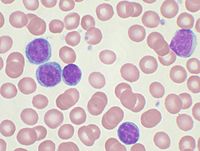
Photo from wikipedia
Importance The prognostic significance of clonal T-cell receptor (TCR) rearrangement or low-level blood involvement as assessed by flow cytometry for patients with early-stage cutaneous T-cell lymphoma (CTCL) is not clear.… Click to show full abstract
Importance The prognostic significance of clonal T-cell receptor (TCR) rearrangement or low-level blood involvement as assessed by flow cytometry for patients with early-stage cutaneous T-cell lymphoma (CTCL) is not clear. Objective To assess the association of low-level blood involvement by TCR clonality and flow cytometry with outcomes for patients with early-stage CTCL. Design, Setting, and Participants A retrospective cohort analysis was conducted from September 1, 2019, to February 29, 2020, of 322 patients with early-stage (I-IIA) CTCL seen at the Winship Cancer Institute of Emory University and Grady Memorial Hospital. T-cell receptor gene rearrangement and flow cytometry records from the peripheral blood were documented at initial assessment. Exposures T-cell receptor clonality and peripheral blood flow cytometry. Main Outcomes and Measures Univariate and multivariable models and Kaplan-Meier assessments were analyzed for overall survival (OS) and time to next treatment. The primary outcome was OS from diagnosis and time to next treatment, and the hypotheses were formulated prior to data collection. Results A total of 322 patients (166 female patients [51.6%]; median age at diagnosis, 53.8 years [range, 8.6-87.4 years]) with early-stage CTCL diagnosed from 1990 to 2018 were identified; of these, 258 had data available for both flow cytometry and TCR. Positive results for both TCR clonality and flow cytometry were associated with inferior OS in early-stage CTCL compared with both having negative results (hazard ratio [HR], 2.86; 95% CI, 1.02-8.06; P = .046). Positive results for only TCR clonality or only flow cytometry were not associated with OS (TCR clonality: HR, 1.31; 95% CI, 0.70-2.47; P = .40; flow cytometry: HR, 1.21; 95% CI, 0.58-2.52; P = .61) or time to next treatment (TCR clonality: HR, 1.05; 95% CI, 0.77-1.43; P = .76; flow cytometry: HR, 0.74; 95% CI, 0.47-1.16; P = .12). However, positive flow cytometry results were associated with reduced OS in the stage IIA subgroup (n = 94; HR, 1.17; 95% CI, 1.18-8.74; P = .02). Covariates associated with reduced survival included advanced age at diagnosis, male sex, and higher disease stage. Conclusions and Relevance This cohort study of patients with early-stage CTCL suggests that low-level blood involvement as indicated by positive results for both TCR gene rearrangement and flow cytometry was associated with inferior OS, whereas positive results for either flow cytometry or TCR clonality was not. More precise measurements of blood involvement in CTCL and larger multi-institutional cohorts are needed to validate the prognostic significance of low-level blood involvement in early-stage CTCL.
Journal Title: JAMA dermatology
Year Published: 2021
Link to full text (if available)
Share on Social Media: Sign Up to like & get
recommendations!